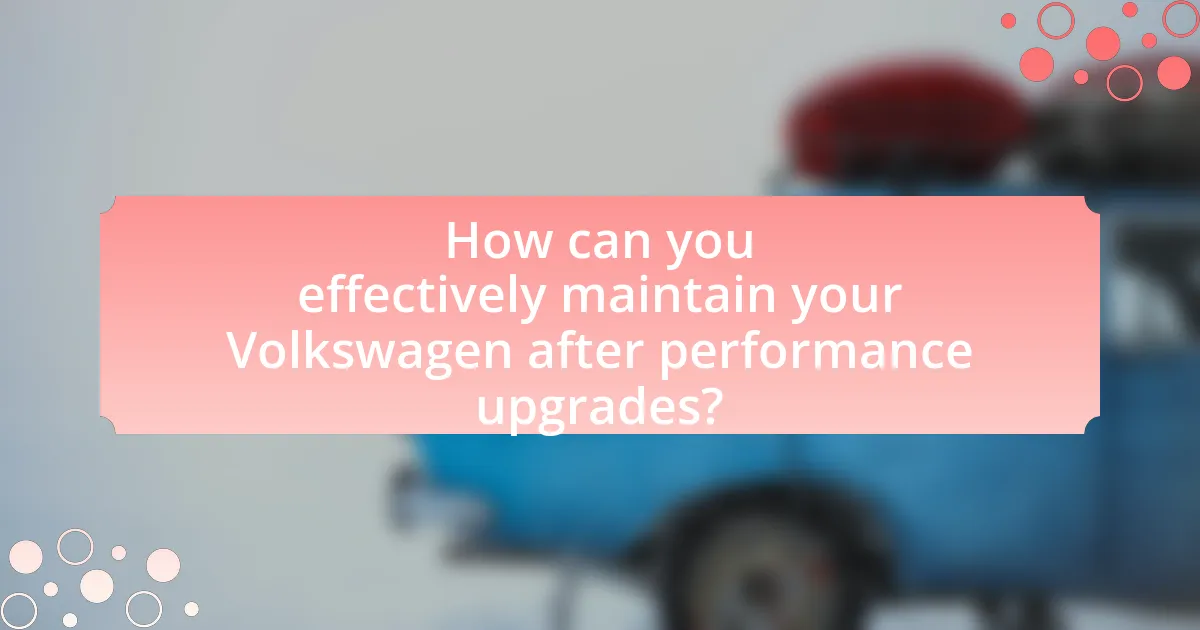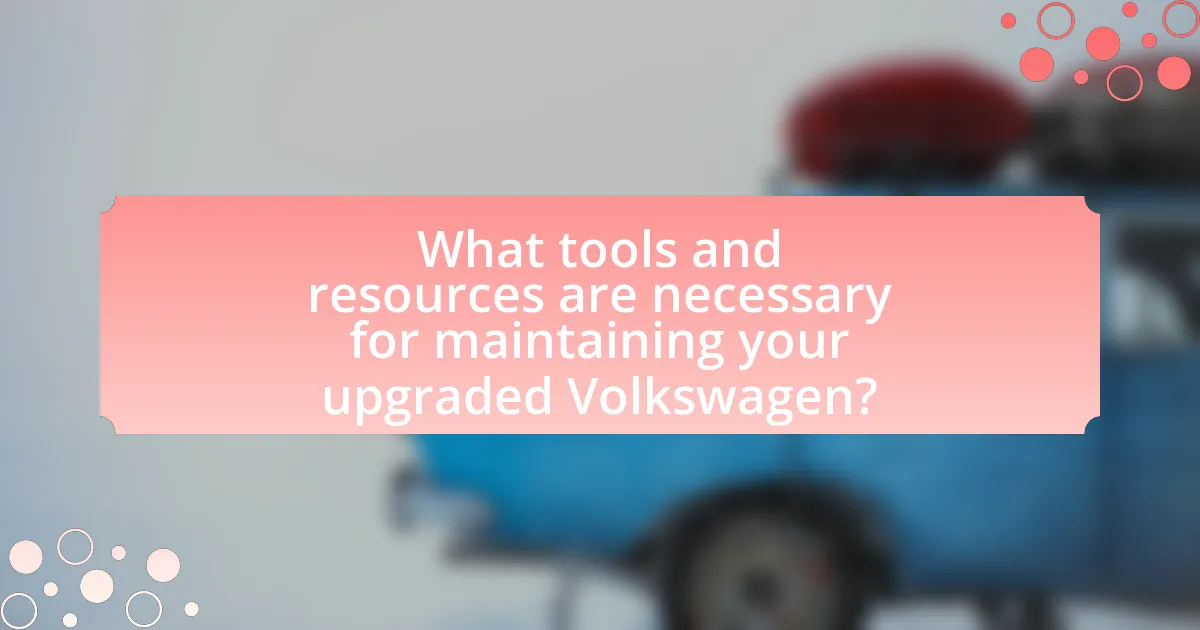The article focuses on maintaining a Volkswagen after performance upgrades, emphasizing the importance of regular maintenance practices to ensure optimal vehicle performance and longevity. Key topics include the necessity of frequent oil changes, monitoring fluid levels, and checking tire health, as performance modifications can increase engine stress and alter vehicle dynamics. It also highlights essential tools for maintenance, the significance of regular inspections, and troubleshooting common issues that may arise post-upgrade. By adhering to these guidelines, Volkswagen owners can effectively manage their vehicles’ performance and reliability after enhancements.

How can you effectively maintain your Volkswagen after performance upgrades?
To effectively maintain your Volkswagen after performance upgrades, regularly check and change the engine oil and filter to ensure optimal lubrication and performance. This is crucial because performance upgrades can increase engine stress, leading to faster oil degradation. Additionally, monitor tire pressure and tread wear, as enhanced performance can affect handling and grip. Regularly inspect and replace air filters to maintain airflow efficiency, and ensure that the cooling system is functioning properly to prevent overheating. Following the manufacturer’s maintenance schedule is essential, as it provides guidelines tailored to your vehicle’s upgraded specifications.
What are the essential maintenance practices for a Volkswagen post-upgrade?
Essential maintenance practices for a Volkswagen post-upgrade include regular oil changes, monitoring fluid levels, and checking tire pressure. Regular oil changes are crucial as they ensure the engine runs smoothly and efficiently, especially after performance upgrades that may increase engine stress. Monitoring fluid levels, including coolant and brake fluid, helps prevent overheating and ensures optimal braking performance. Checking tire pressure is important for maintaining traction and handling, which can be affected by performance modifications. These practices are supported by Volkswagen’s maintenance guidelines, which emphasize the importance of routine checks to prolong vehicle life and performance.
How often should you check the engine oil after performance upgrades?
You should check the engine oil every 1,000 miles after performance upgrades. This frequency is recommended because performance modifications can increase engine stress and oil consumption, leading to faster degradation of oil quality. Regular checks help ensure optimal engine performance and longevity, as studies indicate that high-performance engines may require more frequent oil changes compared to standard engines.
What specific fluids need regular monitoring after upgrades?
After performance upgrades, the specific fluids that need regular monitoring include engine oil, coolant, transmission fluid, brake fluid, and power steering fluid. Engine oil should be checked frequently to ensure optimal lubrication and performance, especially after modifications that may increase engine stress. Coolant levels must be monitored to prevent overheating, as performance upgrades can lead to higher operating temperatures. Transmission fluid is crucial for smooth shifting and should be inspected regularly, particularly if the transmission has been upgraded. Brake fluid needs attention to maintain braking efficiency, especially if performance brakes have been installed. Lastly, power steering fluid should be checked to ensure proper steering response, particularly if the steering system has been modified. Regular monitoring of these fluids helps maintain vehicle performance and reliability post-upgrade.
Why is it important to monitor tire health after performance modifications?
Monitoring tire health after performance modifications is crucial because changes in vehicle dynamics can lead to uneven tire wear and compromised safety. Performance upgrades often increase power and alter weight distribution, which can affect how tires grip the road. For instance, a study by the Tire Industry Association indicates that improper alignment and tire pressure can reduce tire lifespan by up to 30%. Regular monitoring ensures optimal tire performance, enhances vehicle safety, and prolongs tire life, making it essential for maintaining a modified Volkswagen.
How do performance upgrades affect tire wear and pressure?
Performance upgrades can increase tire wear and alter tire pressure due to enhanced power and handling characteristics. When a vehicle’s performance is improved, it often leads to higher speeds and more aggressive driving styles, which can accelerate tire degradation. For instance, upgraded suspension systems may lower the vehicle’s center of gravity, resulting in increased cornering forces that can wear tires unevenly. Additionally, performance tires, which are often used in conjunction with upgrades, may have softer compounds that wear out faster than standard tires.
Moreover, performance upgrades can affect tire pressure because modifications may change the vehicle’s weight distribution and dynamics. For example, if a vehicle is modified to be lighter or has a different weight distribution, the optimal tire pressure may need adjustment to maintain proper contact with the road. Maintaining the correct tire pressure is crucial, as under-inflated or over-inflated tires can lead to increased wear and reduced performance. Therefore, regular monitoring and adjustment of tire pressure are essential after any performance upgrades to ensure safety and longevity of the tires.
What tire types are best suited for upgraded performance Volkswagens?
High-performance tires are best suited for upgraded performance Volkswagens. These tires are designed to enhance grip, handling, and responsiveness, which are crucial for vehicles with increased power and performance modifications. For instance, tires such as Michelin Pilot Sport, Bridgestone Potenza, and Continental ExtremeContact are specifically engineered for high-performance applications, providing superior traction and stability at higher speeds. Their advanced rubber compounds and tread designs contribute to improved cornering and braking performance, making them ideal for modified Volkswagens that require enhanced performance characteristics.
What role does regular inspection play in maintaining performance upgrades?
Regular inspection is crucial for maintaining performance upgrades as it ensures that all components function optimally and identifies potential issues before they escalate. By routinely checking parts such as the engine, exhaust system, and tuning software, vehicle owners can detect wear and tear or misalignments that may affect performance. Studies show that regular maintenance can enhance vehicle longevity and efficiency, with the Automotive Maintenance and Repair Association noting that proactive inspections can prevent costly repairs by up to 30%.
Which components should be inspected frequently?
The components that should be inspected frequently after performance upgrades on a Volkswagen include the engine oil, air filter, fuel system, brakes, and tires. Regular inspection of engine oil ensures optimal lubrication and performance, while checking the air filter maintains proper airflow and engine efficiency. The fuel system should be inspected to prevent clogs and ensure proper fuel delivery, which is critical for performance. Brake components must be examined for wear and functionality to ensure safety, and tire condition should be monitored for tread depth and pressure to maintain handling and traction. Frequent checks of these components help in identifying potential issues early, thus enhancing the vehicle’s performance and longevity.
How can you identify potential issues early on?
To identify potential issues early on after performance upgrades to your Volkswagen, regularly monitor key performance indicators such as engine temperature, oil pressure, and fuel efficiency. These metrics can reveal abnormalities that may indicate underlying problems. For instance, a sudden increase in engine temperature could signal cooling system failures, while decreased fuel efficiency might suggest issues with the fuel system or tuning. Additionally, conducting routine diagnostic scans using an OBD-II scanner can help detect error codes that point to specific malfunctions. Regular visual inspections of components like hoses, belts, and electrical connections can also uncover wear or damage that could lead to larger issues if not addressed promptly.

What tools and resources are necessary for maintaining your upgraded Volkswagen?
To maintain your upgraded Volkswagen, essential tools include a socket set, torque wrench, screwdrivers, pliers, and an OBD-II scanner. These tools enable effective handling of routine maintenance tasks such as oil changes, filter replacements, and diagnostics. Additionally, resources like a repair manual specific to your Volkswagen model and access to online forums or communities can provide valuable guidance and troubleshooting tips. These resources ensure that you have the necessary information and support for maintaining performance upgrades effectively.
What basic tools should every Volkswagen owner have for maintenance?
Every Volkswagen owner should have a basic toolkit that includes a socket set, screwdrivers, pliers, a torque wrench, and an oil filter wrench for maintenance. A socket set allows for easy removal and installation of various bolts and nuts, which is essential for tasks like changing spark plugs or brake pads. Screwdrivers are necessary for adjusting and securing components, while pliers assist in gripping and bending wires or hoses. A torque wrench ensures that bolts are tightened to the manufacturer’s specifications, preventing damage from over-tightening. An oil filter wrench is crucial for changing the oil, as it provides the leverage needed to remove the filter. These tools are fundamental for performing routine maintenance and addressing minor repairs effectively.
How do these tools assist in regular upkeep?
These tools assist in regular upkeep by providing essential diagnostics and maintenance capabilities tailored for performance-enhanced vehicles. For instance, specialized diagnostic tools can monitor engine performance, detect issues early, and ensure that modifications are functioning optimally. Regular use of these tools helps maintain the vehicle’s reliability and efficiency, which is crucial after performance upgrades. Additionally, tools designed for specific tasks, such as oil change kits or tire pressure monitoring systems, facilitate routine maintenance, ensuring that all components are in peak condition. This proactive approach to upkeep ultimately extends the lifespan of the vehicle and enhances driving experience.
What specialized tools might be needed for performance upgrades?
Specialized tools needed for performance upgrades include a diagnostic scanner, torque wrench, and specialized hand tools such as socket sets and pliers. A diagnostic scanner is essential for reading and clearing error codes, ensuring that the vehicle’s electronic systems are functioning correctly after upgrades. A torque wrench is crucial for applying the correct amount of force to bolts, which is vital for engine components and suspension parts to prevent damage. Additionally, specialized hand tools like socket sets and pliers facilitate the installation and removal of various components, ensuring precision and efficiency during the upgrade process.
Where can you find reliable resources for Volkswagen maintenance tips?
Reliable resources for Volkswagen maintenance tips can be found on the official Volkswagen website, which offers detailed guides and manuals specific to various models. Additionally, reputable automotive forums such as VWVortex and dedicated Volkswagen maintenance books provide expert advice and community support. These sources are validated by their extensive user bases and expert contributions, ensuring accurate and practical maintenance information for Volkswagen owners.
What online forums or communities are beneficial for Volkswagen owners?
Volkswagen owners can benefit from several online forums and communities, including VWVortex, TheSamba, and Reddit’s r/Volkswagen. VWVortex is a comprehensive forum that covers a wide range of topics related to Volkswagen vehicles, offering discussions on maintenance, performance upgrades, and troubleshooting. TheSamba focuses on classic Volkswagen models, providing a platform for enthusiasts to share restoration tips and advice. Reddit’s r/Volkswagen serves as a community for sharing experiences, asking questions, and discussing modifications, making it a valuable resource for both new and experienced owners. These platforms collectively provide a wealth of knowledge and support for Volkswagen owners looking to maintain their vehicles after performance upgrades.
How can service manuals aid in the maintenance process?
Service manuals aid in the maintenance process by providing detailed instructions, specifications, and troubleshooting guidelines specific to the vehicle model. These manuals include essential information such as torque specifications, fluid capacities, and step-by-step procedures for repairs and maintenance tasks. For example, a service manual for a Volkswagen may outline the correct procedure for changing the oil or adjusting the suspension after performance upgrades, ensuring that the maintenance is performed correctly and efficiently. This accuracy helps prevent potential issues that could arise from improper maintenance, thereby extending the vehicle’s lifespan and enhancing performance.

How can you troubleshoot common issues after performance upgrades?
To troubleshoot common issues after performance upgrades, start by checking for error codes using an OBD-II scanner, as this can reveal specific problems related to the upgrade. Next, inspect all connections and components that were altered during the upgrade process, ensuring they are secure and functioning correctly. Additionally, monitor engine performance metrics such as fuel trims and air-fuel ratios to identify any discrepancies that may indicate issues. It is also essential to verify that the upgraded parts are compatible with the existing system, as incompatibility can lead to performance problems. Regularly reviewing user forums and manufacturer guidelines can provide insights into common issues experienced by others after similar upgrades, further aiding in effective troubleshooting.
What are the most common problems faced after upgrading a Volkswagen?
After upgrading a Volkswagen, the most common problems include engine misfires, increased fuel consumption, and issues with the vehicle’s electronic systems. Engine misfires can occur due to incompatible tuning or modifications that exceed the engine’s specifications, leading to performance issues. Increased fuel consumption often results from performance upgrades that enhance power but may not optimize fuel efficiency. Additionally, electronic system problems can arise from new components that interfere with the vehicle’s onboard diagnostics or require recalibration. These issues are frequently reported by Volkswagen owners post-upgrade, highlighting the importance of ensuring compatibility and proper installation of aftermarket parts.
How can you diagnose performance-related issues effectively?
To diagnose performance-related issues effectively, utilize diagnostic tools such as OBD-II scanners to read error codes and monitor real-time data from the vehicle’s sensors. These tools provide insights into engine performance, fuel efficiency, and other critical parameters, allowing for targeted troubleshooting. For instance, a study by the Society of Automotive Engineers indicates that using OBD-II systems can reduce diagnostic time by up to 30%, enhancing the accuracy of identifying issues. Additionally, conducting a visual inspection of components like air filters, spark plugs, and fuel injectors can reveal physical signs of wear or damage that may affect performance.
What signs indicate that a performance upgrade may have caused a problem?
Signs that indicate a performance upgrade may have caused a problem include decreased fuel efficiency, unusual engine noises, warning lights on the dashboard, and overheating. Decreased fuel efficiency often occurs when the engine is not calibrated correctly after an upgrade, leading to poor air-fuel mixture. Unusual engine noises can signal improper installation or compatibility issues with new components. Warning lights, such as the check engine light, may illuminate due to sensor malfunctions or error codes triggered by the upgrade. Overheating can result from inadequate cooling systems or increased power output without corresponding upgrades to cooling components. These signs collectively suggest that the performance upgrade may not have been executed properly or is incompatible with the vehicle’s existing systems.
What preventative measures can you take to avoid issues?
To avoid issues after performance upgrades on your Volkswagen, regularly perform maintenance checks, including oil changes, fluid levels, and tire pressure. Consistent monitoring of these elements ensures optimal performance and longevity of the vehicle. For instance, changing the oil every 5,000 to 7,500 miles helps prevent engine wear and maintains lubrication, which is crucial after upgrades that may increase engine stress. Additionally, checking fluid levels, such as coolant and brake fluid, can prevent overheating and braking issues, respectively. Regularly inspecting tire pressure and tread can enhance safety and performance, as improper tire conditions can lead to handling problems.
How can regular maintenance help in preventing performance problems?
Regular maintenance helps in preventing performance problems by ensuring that all vehicle components function optimally and wear is minimized. Routine checks, such as oil changes, filter replacements, and tire rotations, can identify potential issues before they escalate into significant failures. For instance, according to the American Automobile Association (AAA), regular oil changes can improve engine performance and longevity, as dirty oil can lead to increased friction and overheating. Additionally, maintaining proper tire pressure and alignment can enhance fuel efficiency and handling, directly impacting overall vehicle performance.
What best practices should you follow after making upgrades?
After making upgrades to your Volkswagen, it is essential to follow best practices such as conducting a thorough inspection, monitoring performance metrics, and ensuring proper maintenance. Conducting a thorough inspection helps identify any potential issues that may arise from the upgrades, such as leaks or loose connections. Monitoring performance metrics, including engine temperature and fuel efficiency, allows you to assess the impact of the upgrades on your vehicle’s performance. Ensuring proper maintenance, such as regular oil changes and checking fluid levels, is crucial for the longevity and reliability of the upgraded components. These practices are supported by automotive maintenance guidelines that emphasize the importance of post-upgrade evaluations to maintain vehicle performance and safety.


